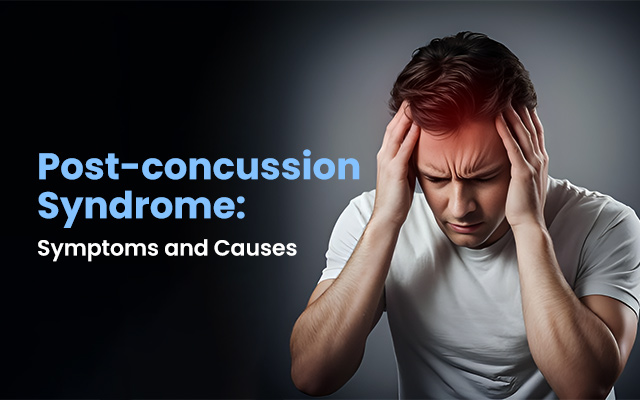If you’ve had a head injury recently and are still feeling off weeks later, mentally foggy, dizzy, or just not yourself. This lingering discomfort might be something called post-concussion syndrome (PCS).
It can sneak up on you after what seemed like a minor bump or a mild fall. And the frustrating part? The symptoms don’t always show up right away.
So, how do you know if it’s PCS and not just stress or tiredness?
In this blog, we’ll look into what post-concussion symptoms are along with its causes and symptoms. Read on to know more from Dr. Rohit Mishra, a neurosurgeon specialising in head injury treatment in Kolkata.
What is post-concussion syndrome?
Post-concussion syndrome is a condition where symptoms from a head injury continue long after the initial impact, sometimes for weeks or even months.
While concussions usually heal within a few days, PCS can linger, causing both physical and emotional challenges.
It doesn’t always depend on the severity of the hit. Even mild injuries can trigger this.
What are the signs of post-concussion syndrome?
Not every headache is a sign of PCS, but if you notice a mix of these symptoms lasting beyond two weeks, it’s worth checking in with a doctor:
Mental and Emotional Symptoms
- Memory problems or brain fog
- Trouble concentrating
- Feeling anxious or easily irritated
- Mood swings or sadness
Physical Symptoms
- Headaches that don’t go away
- Dizziness or feeling lightheaded
- Sensitivity to light and noise
- Sleeping more (or struggling to sleep at all)
- Blurry vision or ringing in the ears
You might experience just a few or several. Every case is unique.
What causes post-concussion syndrome to happen?
Doctors are still researching exactly why PCS affects some people and not others, but here’s what we do know:
- Your brain is still healing – Even if the injury looked minor, internal recovery takes time.
- Stress can make it worse – Emotional strain can heighten symptoms.
- Previous concussions matter – If you’ve had head injuries before, the chances go up.
- Age and gender may play a role – Some studies suggest women and older adults are more likely to develop PCS.
It’s not “in your head.” It’s a real condition—and it deserves proper care.
How long does post-concussion syndrome last?
For most people, PCS goes away on its own in a few weeks. But for others, it can linger for several months.
Factors like age, prior concussions, and mental health can influence the timeline.
What’s important is not to ignore the symptoms, because pushing through might only delay your recovery.
Where can I get proper head injury treatment in Kolkata?
If you or someone you care about is showing signs of PCS, it’s crucial to get evaluated by a specialist who understands head injuries, especially those with long-term effects.
For advanced head injury treatment in Kolkata, you can consult Dr. Rohit Mishra, who focuses on both physical and emotional recovery.
- Treatment mainly includes:
- Rest and lifestyle modifications
- Balance and vision therapy
- Counselling support if needed
- Gradual return to work
A tailored approach ensures you’re not just recovering, but getting your life back on track.
Don’t wait it out- Get it checked
It’s easy to brush off symptoms, especially if they seem unrelated. But if weeks have passed since your head injury and you still feel “off,” it’s time to take it seriously.
Seek help today
Whether it’s persistent headaches, emotional ups and downs, or difficulty focusing, post-concussion syndrome is treatable with the right guidance.
And if you’re in the city, don’t delay. Consult Dr. Rohit Mishra, an expert for head injury treatment in Kolkata today and give your brain the care it deserves.

